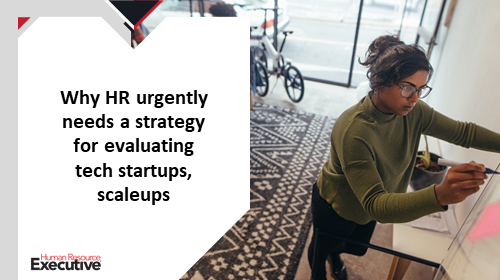The next wave of HR technology innovation will emerge in 2022, bringing opportunity and risk for HR leaders.
There has been a remarkable surge in both global spending and funding for HR technology in 2021. Sapient Insights reported in its latest HR Systems Survey that 2021 was up 57% over last year on the spending front. Global funding is even more jaw-dropping. WorkTech’s global VC reporting puts 2021’s year-to-date total nearing $17 billion with December, usually a very active month for investments, still weeks away. For perspective, if the year ended tomorrow, 2021 has seen as much VC investment as 2018, 2019 and 2020 combined.
Why should an HR leader care?
A lot of this revenue and funding goes directly into product innovation and development. The resulting products will be vying for the HR leader’s attention before you know it. This funding surge has fueled innovation that will emerge as products for HR’s consideration throughout 2022 at a scale we haven’t seen before. The consistent increase in global HR tech funding has resulted in more than 1,100 deals thrusting startups and scaleups to market in the last four years. Meanwhile, the continued HR technology spending has funded R&D and product development for “legacy” or more mature tech providers in the space.
HR needs some new tech to deliver on the future of work.

Survey: Help us find out What’s Keeping HR Up at Night?
HR leaders in companies of all sizes are looking forward to 2022 with change in mind. As they implement new programs and policies to respond to the impact of the pandemic on the workforce and shepherd in a more promising future of work, they’re looking for new technology to help. PwC reports that 74% of businesses plan to increase their spending on HR tech.
The stakes couldn’t be much higher.
As most employers are struggling to hire and reports also show that up to 40% of workers are planning to change jobs, there’s little room for error in selecting new HR technology. Considering that the employee experience is becoming increasingly dependent on what’s delivered digitally, HR leaders will find their technology decisions can make or break their programs, making or breaking their company.

Author George LaRocque
If our experience through the COVID-19 pandemic has taught us anything, it’s that we can only see one or two quarters ahead at best before the following change comes along. Progressive HR leaders are looking for innovative tech partners that can be more agile and responsive to their needs as customers to help them navigate these shifting priorities. Startups and scaleups fit the bill there. We’ve all gotten comfortable with startups in the HR tech stack. I’m a big fan of working with startups. Startups count on their customers to drive product requirements forward and, let’s face it, we all like to feel like a bigger fish in a smaller pond when it comes to securing the capabilities or support our teams need.
However, there is an inherent risk in working with a VC-backed firm. The rule of thumb for VC firms is that they only expect 10% of their portfolios to be successful investments. That doesn’t mean that 90% will go out of business, but it might mean that their lack of revenue growth and funding could render them stagnant.
A new approach to fitting startups in your HR tech stack
As a business-to-business (B2B) HR technology buyer, it’s crucial to manage and allocate your appetite for risk. HR has always counted on the support of the finance department to help vet a tech provider’s terms and conditions. Still, it’s time to enlist them now to evaluate a startup’s financial viability and the risk it does or doesn’t present you your firm.
It’s not just about picking startups that are “well-funded.” A startup with hundreds of millions of dollars in VC and a billion-dollar valuation may be risky to work with if its revenue run rate is too low and its expense “burn rate” is too high. At the same time, a startup or scaleup that has raised “smarter money” and managed its revenue growth and expenses more wisely might demonstrate longer-term viability as a tech partner.
You might look at your HR tech stack like an investment portfolio, taking calculated risks based on your needs. You may be inclined to take a more conservative position in core payroll and benefits areas while investing in a scaleup like Ireland’s Immedis to manage global payroll and analytics or Compa to tie your compensation strategy to the recruiters’ deal desk. Or, in recruiting, where the trends shift incredibly quickly, you could have an innovative scaleup like Greenhouse Software operating your core recruiting workflow or like Paradox.ai engaging candidates with its conversational interface. At the same time, you might invest in upstarts like Kanarys or Handshake to increase candidate diversity and Talmetrix to help align your people analytics with the upcoming SEC reporting mandates for Human Capital.

Whatever your comfort level for working with startups, new HR technology products and platforms are required to deliver a future of work that meets employees’ expectations, along with new and innovative HR programs. Tying the current happenings and trends in the workforce, workplace and HR to the tech innovation emerging from the global HR tech ecosystem defines my role as a market analyst, and it’s what I’ll focus on here monthly in Human Resource Executive®.
George LaRocque, founder and principal analyst of WorkTech (1worktech.com), has more than 25 years in the HR technology industry. He’s an HR leader and tech executive turned market analyst and advisor focused on users and developers of HR and talent technology. George leads the WorkTech research and reports on workforce trends and HR tech VC investment. He is also a Founding Partner of the Impact WorkTech Accelerator, launching the next generation of innovative global work and HR technology. Hear George LaRocque speak during the virtual HR Technology Conference & Expo in March.
Credit: Source link





















